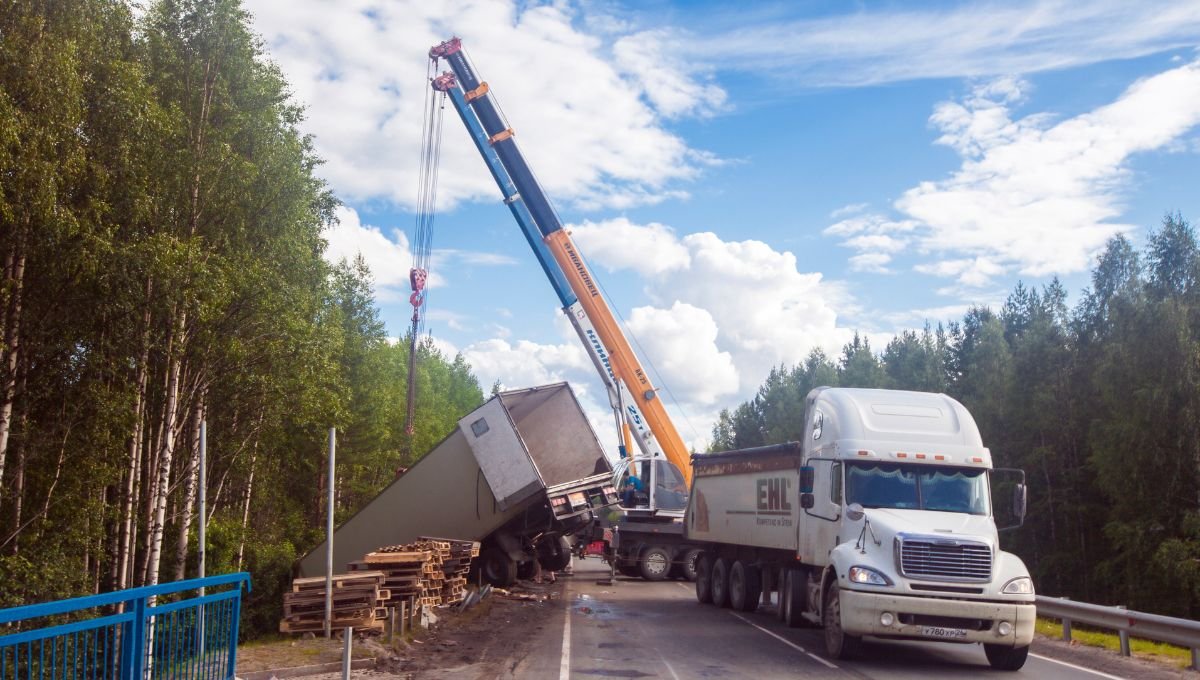Contents
- 1 Truck Accident Lawyer: Your Trusted Advocate in Troubling Times
- 1.1 1. Understanding the Magnitude of Truck Accidents
- 1.2 2. The Role of a Truck Accident Lawyer
- 1.3 3. Why Expertise Matters
- 1.4 4. Emotional Support and Guidance
- 1.5 5. Determining the Worth of Your Claim
- 1.6 6. Latest Trends in Truck Accident Litigations
- 1.7 7. Choosing the Right Lawyer
- 1.8 8. Success Stories
- 1.9 9. Documentation: The Bedrock of Your Case
- 1.10 10. Understand Legal Fees
- 1.11 11. Know What Questions to Ask
- 1.12 12. Emotional Preparedness
- 1.13 13. Learning about the Litigation Process
Truck Accident Lawyer: Your Trusted Advocate in Troubling Times
When dealing with the aftermath of a truck accident, there can be a whirlwind of feelings, pain, and choices to make. A competent advocate, amidst all the mayhem, can make all the difference. In this piece, we’ll discuss why you should retain the services of a truck accident attorney and how they can help you through this trying time.

1. Understanding the Magnitude of Truck Accidents
Collisions involving trucks are different from collisions involving passenger vehicles. Their sheer size and weight mean the consequences can be far more severe. There were 4,119 people killed in collisions involving large trucks in the United States in 2019, per data from the National Highway Traffic Safety Administration (NHTSA). These devastating numbers highlight the need for competent representation.
2. The Role of a Truck Accident Lawyer
A lawyer who specializes in truck accidents represents clients in cases involving accidents involving commercial trucks, semis, and big rigs. The following are some of their primary roles:
- Investigating the Accident: Expertise in the field ensures that all relevant evidence is gathered, witnesses are interviewed, and the accident scene is reconstructed if necessary.
- Negotiating with Insurance Companies: Insurance companies frequently attempt to limit payouts to policyholders. A lawyer is trained to negotiate to maximize their client’s interests.
- Litigation: If negotiation is unsuccessful, your attorney will represent you in court while constructing a convincing case.
3. Why Expertise Matters
Many people, including the truck driver, the trucking company, the truck manufacturer, and the maintenance providers, could be at fault in a truck accident. Properly assessing fault requires in-depth familiarity with federal and state transportation laws. An experienced truck accident attorney will be able to navigate these complexities.
4. Emotional Support and Guidance
Victims must contend not only with the legal complexities but also with the physical injuries and emotional trauma. The role of a lawyer extends beyond the confines of the courtroom. They frequently offer victims emotional support, guiding them through the process of making medical decisions and sometimes even counseling them on potential PTSD or trauma symptoms.

5. Determining the Worth of Your Claim
It’s common for victims to undervalue their cases. A lawyer specializing in truck accidents can help you determine how much you should be compensated for short-term (medical bills, property damage) and long-term (rehabilitation, lost wages, diminished earning capacity) losses. They ensure you get fairly compensated for any losses, material or otherwise.
6. Latest Trends in Truck Accident Litigations
It is essential to maintain awareness of the changing landscape of the litigation surrounding truck accidents. Recently, there has been a notable shift toward holding trucking companies more accountable, particularly if they neglect proper driver training or vehicle maintenance. This is especially true when trucking companies neglect to maintain their vehicles properly. Your familiarity with such patterns can significantly impact the result of your case.
7. Choosing the Right Lawyer
Choosing a lawyer knowledgeable in their field is important; however, selecting a lawyer who genuinely cares about their client’s wellbeing is equally important. It would be best if you looked for attorneys with a history of winning settlements and verdicts. Still, it would be best to evaluate them based on how approachable, empathetic, and willing they are to go the extra mile.
8. Success Stories
It’s helpful to hear the experiences of those who have been where you are. Many people seeking professional legal counsel were rewarded with satisfactory settlements that allowed them to heal and move on. Their experiences show that having a knowledgeable and sympathetic advocate can significantly impact you.
How to Prepare for Your First Meeting with a Truck Accident Lawyer
After a truck accident, finding your footing in the turbulent waters that follow can be difficult. When considering getting legal representation, preparation is of the utmost importance. You can follow the following guide to ensure that your first meeting with a truck accident lawyer is productive and reassuring.

9. Documentation: The Bedrock of Your Case
Before your consultation:
- Gather Evidence: It is essential to take photographs of the accident scene, the extent of the damage to the vehicles involved, as well as any injuries that may have been sustained.
- Compile Medical Reports: These aspects highlight the potential short-term and long-term effects on one’s health.
- Collect Witness Statements: If there were any witnesses, their testimonies could provide an extremely helpful perspective.
- Maintain a diary: Note how you feel physically and emotionally after the accident. This record may demonstrate the long-term effects of the traumatic event.
10. Understand Legal Fees
The attorney’s fee structure must be clarified before discussing your case. Many attorneys specializing in cases involving truck accidents take cases on a contingency fee basis, meaning they only get paid if their client wins the case. Make sure that you have a good understanding of the percentages as well as any other potential costs.
11. Know What Questions to Ask
Your first appointment with the attorney allows you to assess their knowledge level and your ability to work with them. Think About Inquiring:
Their prior work involved cases involving truck collisions.
Their evaluation of your case’s merits, including its strengths and difficulties,
The timetable that is anticipated for the resolution
12. Emotional Preparedness
It is easy to see why retelling the accident story can be upsetting. It might be helpful to bring a close friend or a member of the family who you can count on for moral support. Remember that a competent attorney will listen to your story with compassion and patience.
13. Learning about the Litigation Process
While your attorney will guide you throughout the process, having a fundamental understanding of how the court system works can be helpful. This includes the following:
Filing the lawsuit.
During the discovery phase, both parties are responsible for gathering evidence.
Discussions leading up to the possibility of a compromise or settlement being reached
If the two sides cannot agree, the case will go to trial.
If, after the meeting, you find that you still have concerns, it is not inappropriate for you to look for a second opinion. Your ease and confidence in your chosen attorney are of the utmost importance.

Conclusion and Final Thoughts
Recovering from emotional and legal turmoil after a truck accident is a true test of fortitude. A truck accident attorney’s expertise allows them to serve as both an aggressive legal advocate and a sympathetic ally.
As we’ve discussed this expert’s many contributions, it’s become clear that their work isn’t limited to the courtroom; it touches on the heart of rehabilitation and renewal. Although the path forward after an accident may seem daunting, you are never alone if you have competent legal representation. Now, as you face the road ahead, think about the confidence and calm that comes from following advice from an expert. Avoid hesitating. Seek the trusted advocacy you deserve, and embark on your journey towards justice and healing.
If you or a loved one are in this situation, remember that you’re not alone. Consult with qualified attorneys. The American Association for Justice is just one of many reputable groups that can put you in touch with qualified attorneys specializing in this area.
Disclaimer: This article serves as informative content. For accurate legal advice, consult a knowledgeable attorney who can provide tailored guidance based on your specific circumstances and legal matters.

(FAQs) Truck Accident Lawyer
1. What makes truck accidents different from typical car accidents?
Accidents involving trucks are unique because of their size and weight, which can have far-reaching effects. Unlike regular car accidents, truck collisions present unique legal challenges, such as determining fault and complying with federal and state transportation regulations.
2. Why do I need a specialized truck accident lawyer?
A lawyer focusing on truck accidents has expert knowledge of the unique legal issues these incidents raise. Expertise in accident scene investigation, insurance company negotiations, and courtroom advocacy guarantee the best representation and compensation.
3. How can a truck accident lawyer help determine the worth of my claim?
Lawyers specializing in truck accidents can calculate not only the short-term costs of things like medical bills and property damage but also the long-term costs of rehabilitation, lost wages, and diminished earning capacity. They ensure you get fairly compensated for any losses, material or otherwise.
4. What recent trends in truck accident litigation should I know?
A recent development is that trucking companies are held more responsible if they fail to provide adequate driver training or maintain their vehicles. Your awareness of these tendencies might impact your case’s outcome.
5. How should I prepare for my first meeting with a truck accident lawyer?
Before consulting with a professional, keep a journal detailing your post-accident experiences and gather evidence like photos, medical records, and witness statements. Know what to expect financially, what questions to ask your lawyer, and how you’ll feel mentally and emotionally.
6. Is it common for truck accident lawyers to work on a contingency fee basis?
Many truck accident lawyers operate on a contingency fee basis, meaning they only get paid if you win the case. It is important to clarify the exact percentage and potential additional costs at the project’s outset.
7. What should I do if I’m unsure about the lawyer after our initial meeting?
After the initial consultation, looking for a second opinion is acceptable if you still have doubts. It is critical that you feel completely at ease with your chosen attorney.
In these trying times, I hope these frequently asked questions help you understand the situation better and make better choices.
These FAQs are designed to address common concerns and provide clarity for individuals seeking legal assistance after an accident.
Remember that the specifics of your accident attorney case will greatly vary from the answers provided here. Always seek the counsel of an actual attorney if you need help with a legal matter.

References:
National Safety Council, “Large Truck Safety”
NHTSA, “Large Trucks Traffic Safety Fact Sheet”
American Bar Association, “Roles of an Accident Lawyer”
Insurance Information Institute, “Negotiating with Insurance Companies”
Federal Motor Carrier Safety Administration Regulations
Mayo Clinic, “Understanding PTSD after Accidents”
Legal Information Institute, “Damages in Personal Injury Cases”
American Association for Justice, “Truck Accident Accountability Trends”
American Bar Association, “Choosing the Right Lawyer”
Personal Injury Lawyers Association, “Success Stories”
American Association for Justice, “Find a Lawyer”
Legal Information Institute, “Evidence in Personal Injury Cases”
American Medical Association, “Importance of Medical Reports”
American Bar Association, “The Role of Witnesses in Personal Injury Cases”
U.S. Federal Trade Commission, “Understanding Lawyer Fees”
American Association for Justice, “Questions to Ask Your Lawyer”
American Psychological Association, “Coping with Traumatic Events”
American Bar Association, “Understanding the Litigation Process”
Legal Services Corporation, “The Importance of Legal Representation”




